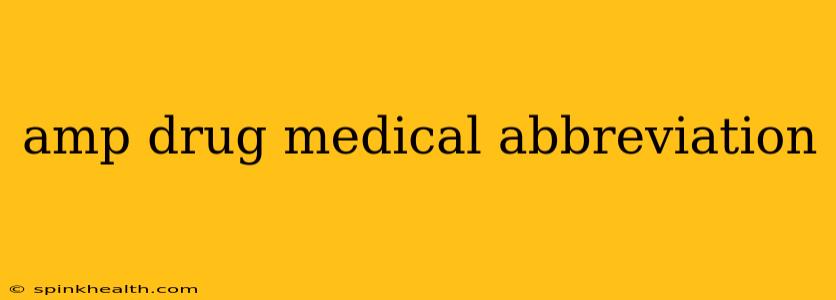The medical abbreviation "amp" often refers to amphetamine, a powerful stimulant drug. Understanding its implications requires delving into its uses, potential for misuse, and associated risks. This isn't just about the abbreviation; it's about the serious consequences associated with amphetamines, both legally prescribed and illicitly obtained.
My journey into understanding "amp" as a medical abbreviation began with a simple question: What exactly is it? That question opened a Pandora's Box of information, highlighting the complexities and potential dangers surrounding amphetamine use. This exploration will aim to answer that initial question, along with several others commonly asked about amphetamines.
What does AMP stand for in medical terms?
In the medical field, "AMP" most commonly stands for amphetamine. It's crucial to remember that this is a powerful psychostimulant medication, not something to be taken lightly. Amphetamines are categorized as Schedule II controlled substances by the U.S. Drug Enforcement Administration (DEA) due to their high potential for abuse and dependence. This strict categorization underscores the seriousness of their use and the need for careful medical supervision.
What are amphetamines used for medically?
Amphetamines have legitimate medical applications, primarily in the treatment of specific conditions such as:
-
Attention-Deficit/Hyperactivity Disorder (ADHD): In children and adults, certain amphetamines are prescribed to help manage symptoms like hyperactivity, impulsivity, and difficulty focusing. These medications work by increasing levels of dopamine and norepinephrine in the brain, neurotransmitters crucial for attention and focus.
-
Narcolepsy: This sleep disorder can cause excessive daytime sleepiness and sudden sleep attacks. Amphetamines help combat this by promoting wakefulness.
-
Obesity (in certain cases): While less common now due to safer alternatives, amphetamines were once used as appetite suppressants. However, this use is often avoided because of significant risks of cardiovascular problems and potential for addiction.
It's crucial to emphasize that amphetamines for medical use are only prescribed and monitored by qualified healthcare professionals. Self-medicating or obtaining amphetamines illegally is incredibly dangerous.
Is amphetamine the same as methamphetamine?
While both amphetamine and methamphetamine are stimulant drugs, they are distinct. Methamphetamine is a more potent and addictive form of amphetamine. The chemical structure differs slightly, leading to more intense effects and a higher risk of addiction and long-term health problems with methamphetamine. Methamphetamine also poses greater risks to the cardiovascular system.
What are the side effects of amphetamine?
Amphetamine use, even under medical supervision, can lead to side effects. These can range from mild to severe and include:
- Increased heart rate and blood pressure: This is a significant concern, especially for individuals with pre-existing cardiovascular conditions.
- Insomnia: Difficulty sleeping is a common side effect.
- Loss of appetite: This can lead to weight loss.
- Anxiety and nervousness: Amphetamines can exacerbate anxiety symptoms.
- Headaches: Frequent headaches may occur.
- Dizziness: Feeling lightheaded or unsteady on one's feet.
- Severe side effects (rare but possible): These include heart attack, stroke, and seizures.
What are the dangers of amphetamine abuse?
The non-medical use of amphetamines presents significant health risks. Chronic abuse can result in:
- Addiction: Amphetamines are highly addictive, leading to compulsive drug-seeking behavior and withdrawal symptoms upon cessation.
- Cardiovascular problems: Increased heart rate, blood pressure, and risk of heart attack and stroke.
- Mental health issues: Amphetamine abuse can worsen existing mental health conditions or trigger new ones, such as psychosis and anxiety disorders.
- Dental problems: "Meth mouth," characterized by severe tooth decay and gum disease, is a common consequence of methamphetamine abuse.
- Neurological damage: Long-term use can damage the brain.
Understanding the medical abbreviation "amp" goes beyond simply knowing it stands for amphetamine. It requires recognizing the significant implications for both medical use and the potential for abuse. Responsible use, under strict medical supervision, contrasts sharply with the dangers of illicit amphetamine use. This information is intended for educational purposes and is not a substitute for professional medical advice. Always consult a healthcare professional for any health concerns.

